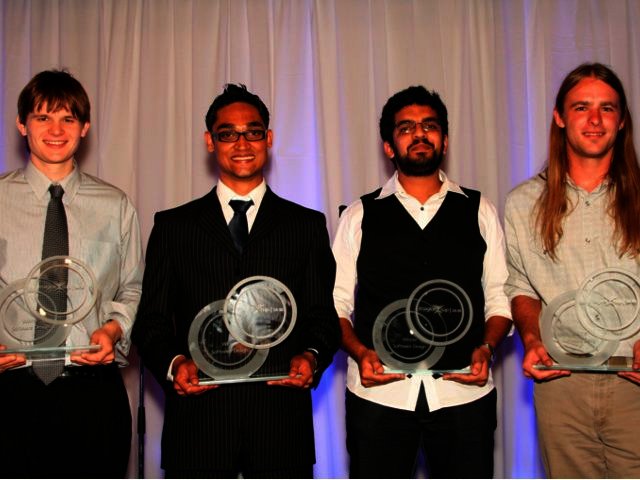PREVIOUS ARTICLENEXT ARTICLE
NEWS

Local Imagination Cup winners off to New York
By Staff Writer 6 July 2011 | Categories: news
At the end of last year Microsoft South Africa held the local round of its Imagine Cup in Pretoria, providing local student computer programmers with the opportunity to showcase their technological talents.
Taking top honours at that local leg of the competition was Team KOMODO, a group of four students from the University of Cape Town. These four students, Richard Sadie, Pieter Roodt, Junaid Parker and Mohammed Irfaan Imamdin, will now be jetting off to New York tomorrow to compete in the Imagine Cup worldwide finals. At these finals, they will be up against 124 teams from 73 countries.
Their project, HAWK, is a three part aggregation platform, which utilises the power of geo-coded data to do three main functions, namely:
1) Provide an open capture and reporting system for disaster management the likes of earthquakes and floods.
2) Leverage the power of the systems geo-awareness to create an early warning system that can reduce the fatal and damaging effects of disasters. This system knows where emergencies are happening and which people are closest to them.
3) Focusing the crowd-sourcing reporting ability at a neighbourhood level, allowing communities who have never met to collaborate via the web, enabling them to report on crime, civic infrastructure, and to drive new conversations on improving areas.
Redmond app was their inspiration
Team South Africa said that what inspired them to enter this competition was seeing how Microsoft’s Photosynth app was being used to create “greater than sum of parts” information views out of photos.
This spurred on the idea that the information that exists on the various social media platforms can also be intelligently stitched together. When this is powered by geo-location information, it can create a powerful capturing and reporting tool, which is intelligent enough to bring users relevant and reliable information that can be employed to make better decisions which affect lives and livelihoods.
In South Africa the Imagination Cup initiative began in 2003 and has seen rapid year-on-year growth. The number of participating students has increased from 100 in 2003 to more than 2500 in 2010.
You can follow Team South Africa’s progress in one of the following manners:
Taking top honours at that local leg of the competition was Team KOMODO, a group of four students from the University of Cape Town. These four students, Richard Sadie, Pieter Roodt, Junaid Parker and Mohammed Irfaan Imamdin, will now be jetting off to New York tomorrow to compete in the Imagine Cup worldwide finals. At these finals, they will be up against 124 teams from 73 countries.
Their project, HAWK, is a three part aggregation platform, which utilises the power of geo-coded data to do three main functions, namely:
1) Provide an open capture and reporting system for disaster management the likes of earthquakes and floods.
2) Leverage the power of the systems geo-awareness to create an early warning system that can reduce the fatal and damaging effects of disasters. This system knows where emergencies are happening and which people are closest to them.
3) Focusing the crowd-sourcing reporting ability at a neighbourhood level, allowing communities who have never met to collaborate via the web, enabling them to report on crime, civic infrastructure, and to drive new conversations on improving areas.
Redmond app was their inspiration
Team South Africa said that what inspired them to enter this competition was seeing how Microsoft’s Photosynth app was being used to create “greater than sum of parts” information views out of photos.
This spurred on the idea that the information that exists on the various social media platforms can also be intelligently stitched together. When this is powered by geo-location information, it can create a powerful capturing and reporting tool, which is intelligent enough to bring users relevant and reliable information that can be employed to make better decisions which affect lives and livelihoods.
In South Africa the Imagination Cup initiative began in 2003 and has seen rapid year-on-year growth. The number of participating students has increased from 100 in 2003 to more than 2500 in 2010.
You can follow Team South Africa’s progress in one of the following manners:
USER COMMENTS
Most Read Articles
Read

Magazine Online
TechSmart.co.za is South Africa's leading magazine for tech product reviews, tech news, videos, tech specs and gadgets.
Start reading now >
Download latest issue
Have Your Say
What new tech or developments are you most anticipating this year?
New smartphone announcements (45 votes)
Technological breakthroughs (29 votes)
Launch of new consoles, or notebooks (14 votes)
Innovative Artificial Intelligence solutions (29 votes)
Biotechnology or medical advancements (24 votes)
Better business applications (160 votes)



